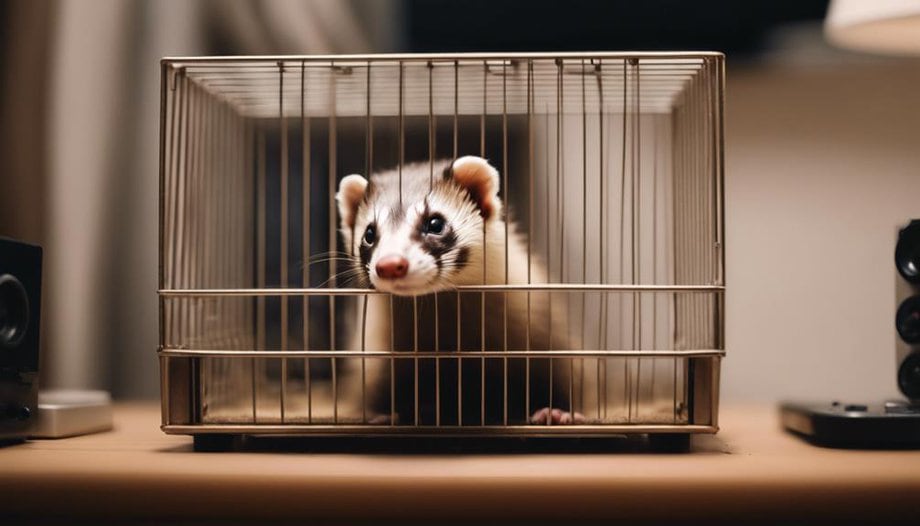Why Proper Cage Location Matters for Your Ferret's Well-being

Proper cage location is essential for your ferret's well-being because it impacts their exposure to natural light, ventilation, temperature, noise levels, and social interaction opportunities.
Having the cage in a spot with adequate natural light helps regulate their sleep patterns and overall mood. Additionally, good ventilation ensures fresh air circulation, which is crucial for their respiratory health. Temperature control is also vital, as ferrets are sensitive to extreme heat or cold. Noise levels should be considered too, as loud or constant noises can stress them out. Lastly, placing the cage in a social area of your home allows for more interaction with family members, which is beneficial for their mental stimulation and overall happiness.
Importance of Cage Location
Choosing the right location for a ferret's cage is crucial for their overall well-being and happiness. When considering space utilization, it's important to provide ample room for the ferret to move around freely, exercise, and play. Aesthetic appeal shouldn't be overlooked, as a visually pleasing environment can positively impact the ferret's mood and mental health.
Routine maintenance is simplified when the cage is placed in a convenient location. Easy access to cleaning supplies and disposal areas can streamline the cleaning process, ensuring a hygienic living space for the ferret. Privacy concerns should also be taken into account. Placing the cage in a quiet area away from high traffic zones can help reduce stress and create a safe retreat for the ferret to rest undisturbed.
Natural Light and Ventilation

To ensure optimal well-being for a ferret, it's essential to consider the availability of natural light and proper ventilation in their cage location. Sunlight exposure plays a crucial role in a ferret's health and behavior. Ferrets are crepuscular animals, meaning they're most active during dawn and dusk. Providing access to natural light helps regulate their internal clocks, promoting a healthy sleep-wake cycle and overall well-being.
Fresh air and ventilation are equally important for ferrets. These curious animals have a keen sense of smell and require good air circulation to prevent odors and maintain a healthy environment. Proper ventilation also helps control humidity levels, reducing the risk of respiratory issues.
When setting up a ferret's habitat, consider their natural habitat preferences. In the wild, ferrets enjoy burrowing and exploring open spaces. Mimicking these conditions in their cage location can help reduce stress and encourage natural behaviors. By prioritizing natural light exposure and ventilation, you can create a comfortable and enriching environment that supports your ferret's well-being.
Temperature and Humidity Considerations

Maintaining appropriate temperature and humidity levels is crucial for ensuring the well-being of a ferret in their living environment. Ferrets are sensitive to extreme temperatures; they thrive in moderate conditions similar to those preferred by humans. It's essential to regulate the temperature within the ferret's cage, aiming for a range of 60-70°F (15-21°C) to keep them comfortable. Using a thermometer inside the cage can help monitor these levels accurately.
Humidity control is equally important for your ferret's health. Ferrets require a humidity level of around 40-60% to prevent skin dryness and respiratory issues. To maintain optimal humidity, consider using a humidifier or dehumidifier depending on the ambient levels in your home. Additionally, providing a water bowl inside the cage can help increase humidity through evaporation.
Noise Levels and Disturbances

Ferrets are sensitive to loud noises and disturbances, which can cause them stress and anxiety. Providing a quiet environment is crucial for their well-being, as it helps minimize disruptive sounds that could agitate them.
Quiet Environment Importance
A quiet environment is crucial for a ferret's well-being, as noise levels and disturbances can significantly impact their overall health and happiness. Ferrets, as sensitive animals, thrive in peaceful surroundings that promote a sense of security and tranquility.
To ensure your ferret's well-being, consider the following:
- Importance of Solitude: Ferrets require moments of solitude to rest and recharge, away from loud noises or disruptions.
- Calm Surroundings: Create a serene environment with minimal distractions to help your ferret feel safe and comfortable in their living space.
- Mindful Noise Management: Be mindful of the noise levels around your ferret's cage, keeping it away from loud appliances or high traffic areas to maintain a peaceful atmosphere for your furry friend.
Minimizing Disruptive Sounds
To create a harmonious environment for your ferret, minimizing disruptive sounds is essential for their well-being. Ferrets are sensitive to loud noises, which can cause stress and anxiety. Providing a distraction-free environment is crucial for their health and happiness. Soundproofing solutions can help reduce external noises and create a peaceful space for your furry friend. Consider placing the cage away from high-traffic areas or noisy appliances to minimize disturbances. Here is a table outlining some soundproofing solutions to create a tranquil space for your ferret:
| Soundproofing Solutions | Description | Benefits |
|---|---|---|
| Soft bedding | Absorbs sound vibrations | Comfort for your ferret |
| Carpeted floors | Reduces noise from footsteps | Quieter environment |
| Heavy curtains | Blocks external noises | Peaceful ambiance |
Social Interaction Opportunities

For a ferret to thrive in its living environment, ensuring ample social interaction opportunities is paramount. Ferrets are highly social animals that require regular engagement and companionship to stay happy and healthy. Here are three key aspects to consider when providing social interaction opportunities for your ferret:
- Playtime options: Offering various playtime options, such as interactive toys, tunnels, and supervised exploration outside the cage, can keep your ferret mentally stimulated and physically active. Interaction frequency is crucial to prevent boredom and promote bonding between you and your pet.
- Enrichment activities: Incorporating enrichment activities like puzzle feeders, digging boxes, and hide-and-seek games can provide mental challenges and sensory stimulation for your ferret. These activities mimic natural behaviors and help prevent stress and anxiety.
- Socialization opportunities: Introducing your ferret to other compatible ferrets or supervised interactions with humans can fulfill their social needs. Socialization opportunities are vital for preventing loneliness and promoting emotional well-being in your furry friend.
Safety and Security Measures

Ferrets are curious creatures known for their inquisitive nature, making safety and security measures essential in their living environment. Secure locks on cages are crucial to prevent escapes and ensure the ferret's safety.
Additionally, placing the cage in a visible location allows for easy monitoring of the ferret's well-being and behavior.
Secure Locks for Safety
Ensuring that the locks on the ferret's cage are secure is paramount for their safety and well-being. Proper lock maintenance and key management are essential to prevent any accidental escapes and to keep your ferret safe at all times. Here are three crucial tips to enhance the security of your ferret's cage:
- Regularly check and maintain the locks: Inspect the cage locks routinely to ensure they're functioning correctly and aren't loose or damaged.
- Use secure locking mechanisms: Invest in high-quality locks or latches that are ferret-proof to prevent any escape attempts.
- Keep spare keys in a safe place: Store any spare keys in a secure location away from the cage to avoid accidental openings.
Placement for Visibility
Placing the ferret's cage in a well-lit and easily visible area of your home enhances both safety and security for your furry companion. This location allows you to keep an eye on your pet, ensuring they are safe and sound. Moreover, being able to see your ferret easily encourages interaction and engagement, providing natural enrichment and behavioral stimulation. By placing the cage in a central part of your living space, you can create a sense of belonging for your ferret while also promoting mental and physical activity. Remember, visibility is key to maintaining a healthy and happy environment for your beloved pet.
| Benefits of Visibility |
|---|
| Improved safety and security |
| Enhanced natural enrichment |
| Increased behavioral stimulation |
Comfort and Accessibility Factors

To ensure the well-being of your ferret, consider the comfort and accessibility factors when choosing a location for their cage. Creating a space that caters to your ferret's needs is crucial for their happiness and overall health.
- Accessibility: Ensure the cage is easily accessible for both you and your ferret. Placing it in an area where you can easily reach in to clean, refill food and water, and interact with your pet will make caring for them more convenient.
- Comfort: Prioritize your ferret's comfort by choosing a location that's away from direct sunlight, drafts, and noisy areas. Ferrets prefer quiet, cozy spaces where they can rest undisturbed. Additionally, consider the flooring of the area; make sure it's comfortable for your ferret to walk on and doesn't pose any risk of injury.
- Aesthetics: While focusing on your ferret's comfort and accessibility, don't forget about the aesthetics of the cage location. Choose a spot that blends well with your home decor while still meeting the needs of your furry friend. A visually pleasing environment can positively impact both you and your ferret's well-being.
Frequently Asked Questions
How Can I Determine the Best Location for My Ferret's Cage Within My Home?
When determining the best location for a ferret's cage, consider cage height for safety and accessibility. Ensure the room temperature is moderate, avoiding drafts or direct sunlight. Providing a comfortable and secure environment is essential for your ferret's well-being.
Are There Any Specific Recommendations for Cage Placement in Regards to Proximity to Other Pets?
When considering the placement of a ferret's cage in relation to other pets, it's essential to prioritize safety and minimize stress. Keeping the cage away from high-traffic areas or noisy spots can help regulate ferret interactions with other pets and reduce distractions.
Should I Consider Factors Like Household Routines or Daily Activities When Choosing a Location for My Ferret's Cage?
Considering household dynamics and daily routines is crucial when selecting a location for a ferret's cage. By aligning the cage with these factors, one can ensure the pet's well-being and create a harmonious environment for both the ferret and the family.
Are There Any Special Considerations for Placing the Cage Near Windows or Doors?
When placing a ferret's cage near windows or doors, consider natural lighting for their well-being. Ensure privacy for a safe retreat. Be mindful of noise levels and temperature fluctuations to create a comfortable environment that nurtures their health and happiness.
How Can I Ensure That My Ferret's Cage Is in a Safe and Secure Location Within My Home?
To ensure the safety and well-being of a ferret, one should prioritize cage accessibility by placing it away from hazards like wires and keeping doors secure. Enrichment activities and a regular cleaning routine are essential for a happy pet.











